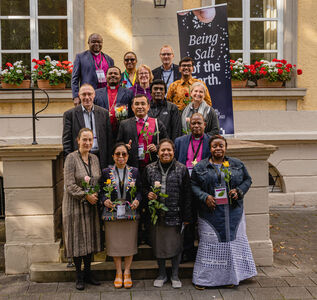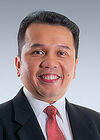The governing organs of the United Evangelical Mission are laid down in the Constiution:
The General Assembly
The Council and
The Management Team.
The General Assembly is formed every six years, but meets every three years. It currently consists of 73 delegates from the 39 members of the UEM. The Regional Assemblies Africa, Asia and Germany are established as committees of the Assembly. They include the delegates of the General Assembly from each region as well as additional delegates from the region. The regional assemblies meet in rotation with the General Assembly.
The governing organs of the United Evangelical Mission are established in the Constitution:

The Council consists of 14 delegates of the General Assembly:
The Council advises and supervises the the Management Team, elects the General Secretary, appoints the General Secretariat and the Executive Secretaries for Finance and Administration and one other Executive Secretary as members of the Management Team.
Members of the Management Team:
Rev. Dr. Andar Pasaribu Parlindungan, General Secretary; Rev. Dr. John Wesley Kabango, Head of Region Africa/Germany, Deputy General Secretary; Timo Pauler, Head of Finance and Administration, Deputy General Secretary; Rev. Dr. Dyah Krismawati, Head of Region Asia/Germany.
The Management Team consists of up to eight persons, all of whom except the General Secretary are appointed for a term of four years.
The UEM Management Team is not to be confused with the "Executive Committee" (Vorstand) described in §26 of the German Civil Code, which at the UEM is known as the General Secretariat and has three members:
The General Secretary chairs the Management Team as well as the General Secretariat. The General Secretary has an eight-year term and is eligible for re-election.
The Regional Assemblies are organised as committees of the General Assembly. Each of these regional assemblies consists of the General Assembly delegates from that region along with additional delegates from the region. The Regional Assemblies meet in the off-years of the General Assembly.
Two Regional Departments
The Africa Region is headed by the Executive Secretary African Region, based in Wuppertal. The Deputy Executive Secretary of the Africa Region heads the UEM office in Dar es Salaam in Tanzania. The Asia region is headed by the Executive Secretary Asia Region, also based in Wuppertal. The deputy head of the Asia region heads the UEM office in Pematangsiantar in Indonesia. Since October 2022, the German Region has been led by the Executive Secretaries Africa and Asia. The Deputy Executive Secretary of the German Region is based in the Wuppertal office.
The regional offices in Tanzania and Indonesia are mainly responsible for planning and implementing joint programs.In the Germany region, programs are implemented in the context of our concept "Global Learning in Ecumenical Perspective (GLEP)".
Two Programmitic Departments
The program work is divided into 2 departments. The Global Program I department includes the programs and projects on development, evangelism, the volunteer programs (South-North, South-South and North-South) and the VEM scholarship program. The Global Program II department includes the programs and projects on justice, peace and the integrity of creation, the International Diaconia and the Interregional Women's Network.
More information about the UEM, the working methods and organizational structures can be found here.


IBAN: DE45 3506 0190 0009 0909 08
SWIFT/BIC: GENODED1DKD
![]() spenden@vemission.org
spenden@vemission.org
![]() 0202-89004-195
0202-89004-195
![]() info@vemission.org
info@vemission.org
![]() 0202-89004-0
0202-89004-0
![]() presse@vemission.org
presse@vemission.org
![]() 0202-89004-135
0202-89004-135